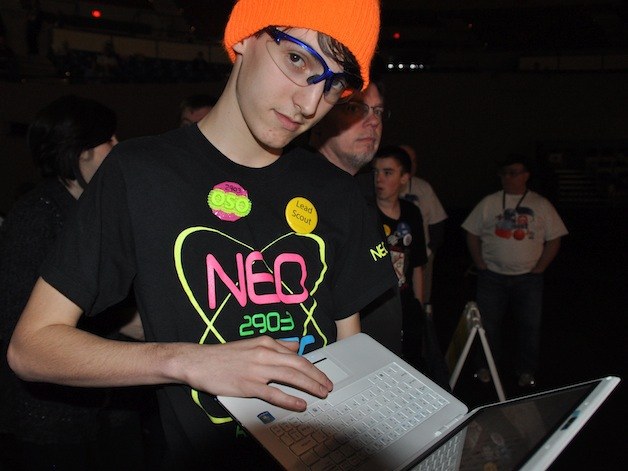ARLINGTON — Although they weren’t able to move past the Pacific Northwest District Championships in Portland, Ore., on Friday, April 11, the Arlington High School NeoBots FIRST Robotics Team 2903 ultimately achieved its most successful season in its six years of competing against other schools in the FIRST Robotics Competition.
Not only did an alliance of Arlington, Lynnwood and Ballard school teams win the Mount Vernon District Tournament, but the Arlington team won the Inspiration in Engineering Award in the Shorewood District, for the AHS students’ work in promoting engineering to younger students in the community, through their past two years of summer camps for elementary and middle school students so that those younger students can learn more about robotics.
AHS NeoBots Team President Caroline Vogl was nominated for the Dean’s List Award, for her leadership and her role in getting information about the team out to the public online, while Mark Ehrhardt, the technology director for the Arlington School District, was nominated for a top mentor award due to the many hours he’s spent on evenings and weekends to help the team succeed. Ehrhardt was quick to share credit with a number of other adult mentors, from businesses throughout the area, who have dedicated their time to the team as well.
“We didn’t win anything at the Pacific Northwest District Championships, but we learned a lot from all of these high caliber teams in one place,” Vogl said of the event, which pitted the 34 members of the AHS NeoBots against 64 other school teams from throughout the region. “We have a number of new ideas on how to rearrange our club structure, and what we should do at competitions.”
This year’s challenge for all the robotics teams was called “Aerial Assist,” and tasked each team with maneuvering a 24-inch exercise ball from one end of the field to the other, at which point the team needed to achieve either the high goal of seven feet off the ground, or the low goal of seven inches off the ground. The game was further complicated by the awarding of bonus points when multiple robots possessed the ball before it was scored, or when robots launched the ball over a truss that was suspended six feet above the middle of the field.
AHS junior Tyler Sudderth, a first-year member of the team, agreed with freshman teammate Brandon Kovach that the “defendy stick” apparatus proved problematic in its operations, but Sudderth touted the NeoBots robot’s ability to block the high goal in its autonomous mode, which set it apart from any of the other robots that he observed during the competitions. Vogl added that another unique feature of the NeoBots’ robot was how the Arlington students could use an Xbox Kinect to control the robot even in its autonomous mode, but for her the most rewarding part of this season was winning the Inspiration in Engineering Award.
“Over my three years on this team, I’ve been part of every outreach effort of our team, so I was very proud to win that award because my hard work and my team’s hard work in the community paid off,” Vogl said. “Our team never expected to do very well. We came prepared to compete, but we didn’t expect to win. That attitude kept the overall attitude of our team positive at the competitions, which made competing easier. We were more concerned with having fun and trying, and not just winning, which kept our stress levels down.”
AHS junior Geoffrey Root has also served on the NeoBots team for the past three years, and this year offered what he deemed some vitally important lessons.
“We learned that we need a better organization structure for future years,” Root said. “We want to improve our scouting at competitions by using new software, and scout for what teams do for outreach awards, not just scouting for robot information.”
Sudderth agreed with Root and Vogl that being able to watch other teams at competitions has been invaluable in providing examples of how the NeoBots can improve their own practices.
In the end, Vogl believes the AHS NeoBots Robotics Team benefits not only its student members, but also the community as a whole.
“Not only are students learning technical and job skills for their futures, but they’re also learning to be leaders and how to communicate, all while they’re actively carrying out a project, and not just sitting in a classroom doing math problems,” Vogl said. “When making robots, there is no ‘C,’ really. Your robot either works or it doesn’t, and that’s like many situations in the real world.”
Vogl added that robotics students develop a habit of giving back to the community through volunteer work.







